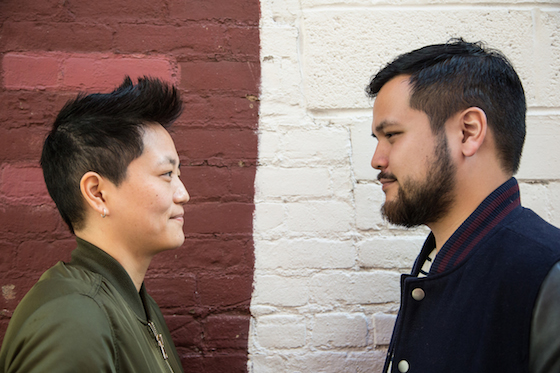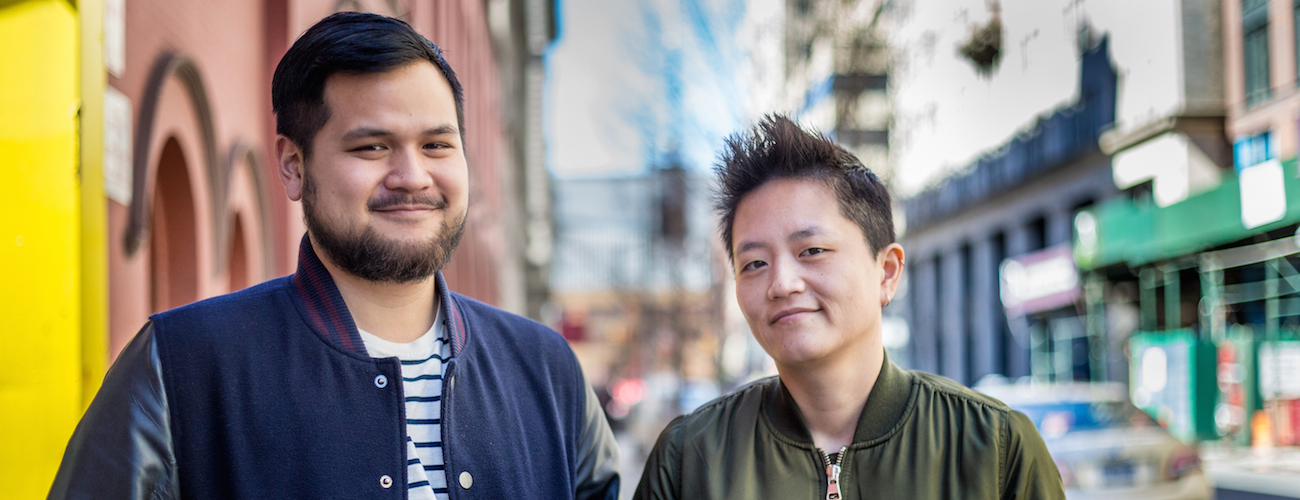Kathy Tu is working some personal things out in the most public way. Take the premiere of the LGBTQ podcast she co-hosts, Nancy, in which Tu once again broached her sexuality with her conservative Taiwanese mother. Or the program’s latest episode, released Sunday, in which she described her reluctance to get “a ’90s boy-band haircut” and apprehension toward the word that may be associated with it, butch.
“I’m working on my insecurities right in front of people,” Tu says in WNYC’s lower Manhattan office, a three-story jungle of audio studios and conference rooms. “Anything I’m feeling anxious about—they make me do a story on it.”
Tu’s co-host, Tobin Low, chimes in with comedic timing no doubt honed behind the microphone: “It’s great for the show.”
Part personal essay, part reported feature, Nancy is a weekly exploration of queer stories that weave together the diverse quilt of LGBTQ culture. The show’s premise—two friends discovering their own identities, and inviting you to discover your own—was one of two winners selected in WNYC’s podcast accelerator two years ago. Its launch last month provides the latest glimpse into how the public radio station is reorienting itself to take full advantage of the podcast boom.
“Our show makes queer people the default—we talk about you like you’re a normal guy,” Tu says playfully, pointing at Low, a professionally trained cellist. The pair met at an audio workshop in 2013, when they were both trying to switch careers (Tu had just finished law school). Their chemistry is what makes Nancy a success.
In some ways, the intimacy of podcasting seems best suited for a topic that is at once immensely personal and in some ways universal. The series adroitly opens with both hosts recounting how they came out to their parents—who had widely divergent responses. “And then,” Low says, “we were really intentional in saying, Let’s start the second episode by watching porn.” Jumping from emotional coming-out stories to a visceral odyssey in sexual education risked throwing listeners off balance. But it also set the mood for a show that attempts to tiptoe between typical media narratives around queerness of either celebration or alienation.
“Both those things can be true and are true,” Low says. But one doesn’t have to come at the expense of the other. Take Nancy’s sixth episode, which featured two gay men from different eras in a powerful conversation about testing positive for HIV. While Nancy’s more arms-length reporting, like its deep dive on gay Republicans, can feel stiff, its conversational journey through stories of self-discovery is rewarding. Add in slick production and creative sound design for a rich listening experience.
What was going on in your life at 29? For David, that was the year his partner died and he tested positive for HIV. pic.twitter.com/ayGUvMRwEV
— Nancy Podcast (@NancyPodcast) May 12, 2017
Nancy is the latest bid for WNYC Studios, the public radio station’s podcast arm, to grow its footprint far outside of New York. Indeed, the number of weekly podcast listeners in the US has more than doubled in the past four years, to 15 percent of Americans, according to Edison Research surveys. These audiences skew younger, more affluent, and better educated than the general population. Media companies are investing heavily in the medium in the hope of capitalizing on this inherently mobile storytelling format.
There are startups, like Gimlet Media, Crooked Media, and The Ringer, designed wholly or largely around podcasting. Slate has built out a robust, well, slate of longform talk shows, and The New York Times has launched a so-far-impressive daily newscast.
But the tested radioheads at the likes of NPR, This American Life, and WNYC still dominate the nascent market for on-demand audio content. The latter’s shows drew an estimated 35 million streams and downloads in April, according to the analytics firm Podtrac. And the station’s betting that shows like Nancy can help expand that base by targeting audiences that wouldn’t necessarily tune in for broadcast programs.
“Radio needs what radio needs, and that’s different from podcasts,” says WNYC Chief Content Officer Dean Cappello. “The tough part is finding people with unique points of view. And once we’ve done that, I would argue we’ve solved about 80 percent of our problems.”
That was the central mission of WNYC’s podcast accelerator in 2015, when Tu and Low’s pitch for a personality-driven LGBTQ magazine show, Gaydio, was one of two chosen from hundreds of entries. “We’re always looking for new voices, for things people aren’t finding right now,” says Paula Szuchman, WNYC’s VP of on-demand content. “We’re trying to reflect the city we’re in.”
The idea behind the accelerator was to spot new talent and incubate it in-house. And over the following few months, Tu and Low produced a pilot that Szuchman pitched internally to the WNYC production staff and sales teams. The show that was eventually greenlighted, Nancy, features themes of self-exploration and acceptance—New York values—with far-reaching appeal.

Amy Pearl / WNYC Studios
“This is totally consistent with what is happening with on-demand video and comedy shops,” Cappello adds. “Are you backing Mad Men or are you backing Matt Weiner? It’s the age of the creator….Let’s support the really creative people and let them deliver over and over again.”
The station already boasts a cadre of these creative types, who’ve delivered massive successes with the likes of Radiolab, Freakonomics Radio, and, to a lesser extent, Death, Sex & Money and Here’s The Thing, hosted by Alec Baldwin. Such heavy-hitters have allowed WNYC Studios to try to build on its core audience through concepts and voices not typically heard on public radio.
On the more conventional end of the spectrum, the Radiolab spinoff More Perfect dives deep into how the Supreme Court affects daily life. 2 Dope Queens, hosted by two women of color, injects a potent blend of comedy and social commentary into a format that has been criticized for its overwhelming whiteness. Nancy, which has the feel of a boutique program, nevertheless reached iTunes’s top-10 chart the week it premiered.
In episode 2 we explore the role of Asian men in gay porn. Listen: https://t.co/Rp0r7ibGsm pic.twitter.com/6LTPX3kuNk
— Nancy Podcast (@NancyPodcast) April 15, 2017
Despite the difficulty of drilling deep into podcasts’ audience size, revenue equations for the medium often start with advertising, including the familiar bits about gourmet meal delivery services and deodorizing toilet sprays. “Podcasting, in particular, seems like it could also be super attractive to major donors who want to support something new and interesting,” Cappello adds. “And then the final part is that we’re doing more work on how you take the idea of membership—on radio, that’s a fund drive three or four times a year—when you have on-demand content?”
That last aspect seems particularly promising, as listeners are often intensely loyal to their favorite podcasts and hosts. With the popular lefty program Chapo Trap House, for example, more than 13,000 Patreon donors support the show to the tune of $60,000 a month. “You’re going to hear things over the next year about building community, and then asking that community to help support those shows,” Cappello says of WNYC Studios.
Nancy is attempting to cultivate that community with frequent Facebook Live Q&As, among other forms of engagement. But the core of the program’s appeal is ushering the audience into Tu and Low’s friendship as it plays out on air. “When we go in the studio, our job is not to have that producer brain but to be really authentic, to be in the moment, and to trust [production staff] to tell us when we got it and when we don’t got it,” Low says. “No pre-planned jokes,” adds Tu.
That also means being open to a producer’s idea of, say, turning the recent end of her relationship into a story. “All I do is open up on this podcast, Tu says. “So, this show has been great for me, personally—minus the breakup.”
An earlier version of this story misspelled Paula Szuchman’s surname.
David Uberti is a writer in New York. He was previously a media reporter for Gizmodo Media Group and a staff writer for CJR. Follow him on Twitter @DavidUberti.

